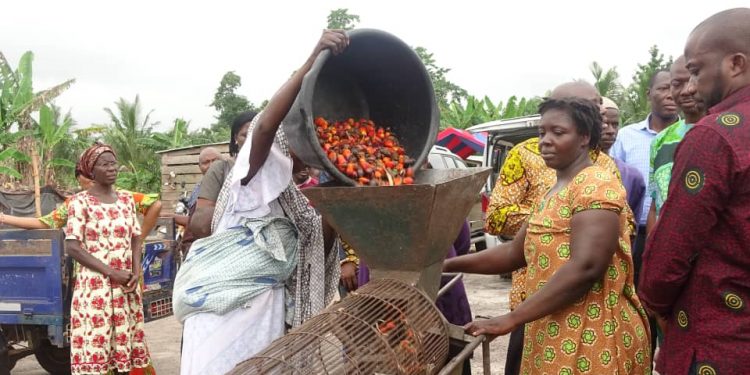Ghana currently imports about 50,000 metric tonnes of palm oil annually.
The country also spends between $600 and $800 to import a tonne of the commodity.
This means that the country spends between $30 million and $40 million to import palm oil each year, depending on the price on the world market.
Palm oil is used primarily in food products: cooking oil, shortening, margarine, milk fat replacer and cocoa butter substitute.
Malaysia and Indonesia are leading producers, together accounting for 86% of global production.
Net importation of the palm oil
Africa Regional Director of ProForest, Mr Abraham Baffoe, who disclosed this to The Finder, explained that Ghana has seen huge net importation of the commodity due to lack of technical know-how and best management practices to improve production on the part of local smallholder farmers.
He spoke to the paper in Accra on the sidelines of the third Roundtable on Sustainable Palm Oil (RSPO).
Technical know-how lacking
He lamented that even though Ghana has a vast land for palm cultivation, most of these lands are cultivated by smallholder farmers who do not have the technical know-how and best management practices to improve on their productivity.
Yield tonnes per for a hectare low for smallholder farmers
For instance, he said, in oil palm growing areas where local farmers occupy about 80% of the farms, major companies are getting about 16 to 20 tonnes per hectare whereas smallholder farmers in the same landscape are getting about only four to six tonnes per hectare.
Closing the gaps
Mr Baffoe stated that closing the gaps in the sector and producing oil palm sustainably would require concerted efforts from government, regional bodies, research institutions, private financiers, investors and technocrats, to ensure the proper understanding and utilisation of oil palm.
That, he said, would move Ghana from a net importer to net exporter of the commodity.
Tree Crop Development Bill
He was of the view that government was doing much in recent time to harness the potential of the oil palm sector.
He explained that the Tree Crops Development Bill, which is key in ensuring that Ghana moves from being a net importer of palm oil to a net exporting country, is currently with Parliament for deliberation and consequent passage into law to regulate the tree crop sub-sector.
Tree Crop Development Bill before Cabinet
“The bill is currently before Cabinet, and upon its passage, hopefully before the end of the year, would establish the Tree Crops Development Authority (TCDA) that would regulate and ensure the production, pricing and marketing of tree crops, including rubber, oil palm, cashew and shea nuts in the country,” he said.
Enormous potential of oil palm
The sector, Mr Baffoe said, has enormous potential for addressing rural poverty and local development.
However, he said, if not planned and implemented very well, “it also has a great potential for social and environmental consequences which we do not want to see”.
“We believe this can be done by joining forces with allies who share the same vision and who are ready to forge strategic, mutually beneficial partnerships to work towards set goals,” he added.
Third Roundtable Conference
Close to 200 delegates came together yesterday for Africa’s third Sustainable Palm Oil Conference, hosted by the RSPO and ProForest, to discuss the urgent need for a long-term sustainable development plan for oil palm production in Africa.
As RSPO’s presence increases with certified members in over 15 countries across Africa, and with stringent new principles and criteria in place, the conference provided an ideal platform for a constructive debate around regional vision and renewed commitment from key producing countries.
With high-profile dignitaries, growers, NGOs, financial institutions and consumer goods manufacturers in attendance, it was mutually acknowledged that if African palm oil producing countries achieve their ambition to convert from net importers to net exporters, palm oil production will significantly increase.
Governor of Edo State in Nigeria, Godwin Nogheghase Obaseki delivered a strong message to delegates and the industry.
“If you are not part of the solution, then you are part of the problem. Let me congratulate all of you here today for demonstrating your commitment to a solution. It is in the interests of all of us in Africa to make sustainable palm oil the norm.”
In a region where livelihoods are intricately connected to both the palm oil sector and natural resources, and where oil palm growing areas overlap areas of international conservation importance such as High Forest Cover (HFC) countries like Gabon, it is vital that any development is done sustainably, ensuring a balance between palm oil production and nature conservation.
RSPO’s Assurance Director, Salahudin Yaacob called for a “long-term sustainable development plan” in the region, stating that “RSPO can only achieve its vision of transforming markets to make sustainable palm oil the norm through collaboration with all stakeholders, from growers to governments and financial institutions to NGOs.”
The conference covered the regional implementation of the 2018 RSPO Principles and Criteria; the role of financial institutions in promoting sustainable agriculture; how governments can mainstream sustainability; and opportunities to change the deforestation narrative in African palm oil producing countries.
The new Decent Living Wage Guidance was also socialised, with members as an important tool to help improve livelihoods.
The Roundtable on Sustainable Palm Oil (RSPO) is a not-for-profit, international membership organisation that aims to unite palm oil’s key stakeholders and create a sense of shared responsibility among growers, manufacturers, refiners, retailers, investors and NGOs, as well as governments and consumers, to transform markets to make sustainable palm oil the norm.





